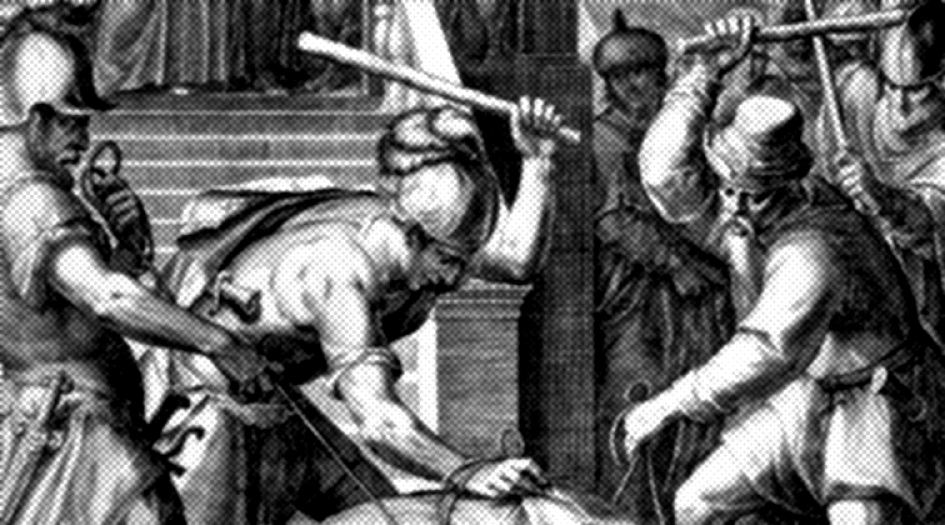“And the men that held Jesus mocked him and smote him. And when they had blindfolded him, they struck him on the face, and asked him, saying, ‘Prophesy, who is it that smote thee?’” (Luke 22:63-64).
Christ’s abusers take great pleasure in torturing him, turning their abuse of him into sport. They blindfold him and strike him, one after the other, while taunting him to say with his eyes covered which one of them is hitting him.
Do they not see? Do they not understand that in doing so, they attempt to cover the very light of the world, that light “that came into the world” (John 1:9) to enlighten, warm, and heal every creature? Do they desire to darken the eyes of the One in whom darkness and light are both alike? (Ps. 139:12). Nothing delights his tormentors more than their dimming of that light and the distortion of that countenance. How contrary is their behavior to David’s prayer in Psalm 80:7, “Turn us again, O God of hosts, and cause thy face to shine; and we shall be saved.”
The psalmist also urges, “lift up your hands in the sanctuary, and bless the Lord,” (Ps. 134:2). But how vigorously these evil and wicked murderers here raise their hands against God’s Christ. How unusual is the mixture of their bitterness, malice, envy, hatred, and scorn, and how willingly they put aside their bickering differences to come together and smite him with their concoction of punishments.
And yet, as horrifying as this scene is – reading that Christ beaten, spit on, mocked, and scourged before a gawking crowd of onlookers – Scripture assures us that this was God’s preordained plan. Acts 2:23 says about Christ, “who being delivered by the determinate counsel and foreknowledge of God, you have taken, and by wicked hands have crucified and slain…”
While hatred lifts her heaviest hand against him in a cacophony of wrongful violence, and scorn sets her insulting foot on him in a contemptuous disdain, we must remember that it is by these stripes, these scourgings, these beatings, that we are healed (1 Peter 2:24). How painful to watch the pure and spotless Lamb of God being brought to the slaughterhouse of filth and sin to be tortured and murdered. But I must remember that it is for my filth and my sin that he goes willingly and silently before his tormentors, for that was God’s way. That was the only way I could ever be redeemed. He did this for me.
Contemplations:
- I am so low, Lord, by nature, that I must with the prophet claim kindred-ship with corruption (Job 25:6). I was dead in my trespasses and sins; my heart was leavened with spite and malice. And yet how mercifully you sought for me in this low and dejected state.
- But, alas Lord, how often have I myself mocked you in hypocrisy when I bow my knees before you but not my heart. Have I given you the empty title of my King, and yet not paid you due tribute?
- Though my sins wound you, Lord, do not let my service mock you as well. Let my labor for you be true, from my heart. Let my allegiance to your kingdom be rooted in truth and love and not in show; not in the form of godliness, but the power of godliness. You who so freely gave your “back to the smiters,” (Isa. 50:6), will not surely deny it to my burdens. Because you did not hide your face from shame and spitting in this time of your trouble for me, I may confidently say with David that you will not hide your face from me in the time of my trouble. You gave your cheeks to those who plucked your beard from your face for me, so surely you will not withdraw them when, with David, I shall in faithful reverence, “kiss the Son lest he be angry.” You who set your face as a flint to endure all these scornful scoffs and blows, how should you not show forth the light of that countenance to me, now, as I seek your face.
Further References for Luke 22:63-64:
Isa. 50:6; Micah 5:1; John 8:59; Matthew 26:4.


